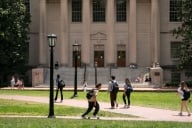You have /5 articles left.
Sign up for a free account or log in.
American adults with a bachelor’s degree live longer than those without one, according to a new study by researchers at the University of Southern California and Princeton University.
American mortality rates declined for nearly a century until the late 1990s. That decline has continued for more educated Americans but has reversed for American adults without a college degree.
“The United States has this increasingly sharp societal division between people who have a college degree and those who don’t,” Angus Deaton, an economics professor at USC, senior scholar at Princeton and co-author of the study, said in a statement. “If you don’t have a four-year degree, not only have your wages been falling for 50 years, but our study shows your adult life expectancy is also decreasing.”
People with some college education have longer life expectancies than people with only a high school diploma, but the gap is much wider between people with and without a four-year degree. By 2018, 25-year-old American adults with a bachelor’s degree could expect to live another 48.2 years out of a possible 50, compared with 45.1 years for adults without a college degree.
Today, a college degree is a better indicator of life expectancy than race. By 2018, the life expectancy of Black Americans with a bachelor’s degree was closer to that of white Americans with a college degree than to Black Americans without one, according to the study. In the past, Black Americans with a college degree had a lower life expectancy than white Americans without a college degree.
The study examines death certificates from the National Vital Statistical System, which includes 48.9 million death records from people aged 25 to 84 who died between 1990 and 2018. The data include age, sex, race, ethnicity, education and year of death. The study does not include any deaths from the COVID-19 pandemic.
The study appears in the Proceedings of the National Academy of Sciences.








